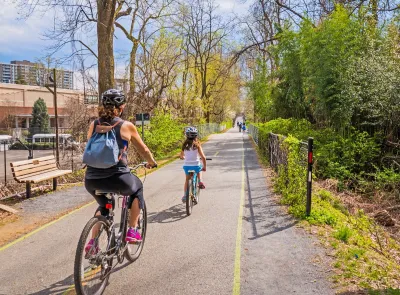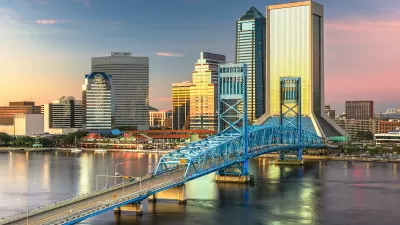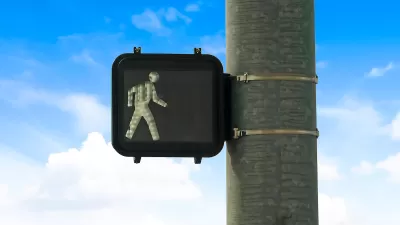The Sarah Debbink Langenkamp Active Transportation Safety Act was spurred by the death of a U.S. diplomat who was killed on her bicycle.

A bill introduced in the U.S. Congress would secure federal funding for bike and pedestrian infrastructure, reports Ginny Bixby in Bethesda Magazine.
The bill, the Sarah Debbink Langenkamp Active Transportation Safety Act, is named in honor of a U.S. diplomat who was killed while riding her bicycle and would allow states and cities to use up to 10 percent of Highway Safety Infrastructure Program funds for bike and pedestrian facilities.
According to Bixby, “This is the second attempt by Raskin and Van Hollen to gain passage of the bill. Last year, the bill didn’t make it onto committee agendas for a vote.” Advocates like Langenkamp’s husband say the bill could help small communities with limited budgets make critical safety improvements.
Maryland Governor Wes Moore signed a similar state act last year, honoring the legacy of Langenkamp, who resided in Bethesda. The law “imposed the same penalties for hitting a cyclist in a bike lane as for hitting a pedestrian or cyclist in a crosswalk – up to two months in jail, and a fine of up to $2,000.”
FULL STORY: Federal bill honoring Bethesda mom killed while cycling would help states fund road safety efforts

Alabama: Trump Terminates Settlements for Black Communities Harmed By Raw Sewage
Trump deemed the landmark civil rights agreement “illegal DEI and environmental justice policy.”

Planetizen Federal Action Tracker
A weekly monitor of how Trump’s orders and actions are impacting planners and planning in America.

The 120 Year Old Tiny Home Villages That Sheltered San Francisco’s Earthquake Refugees
More than a century ago, San Francisco mobilized to house thousands of residents displaced by the 1906 earthquake. Could their strategy offer a model for the present?

LA’s Tree Emergency Goes Beyond Vandalism
After a vandal destroyed dozens of downtown LA trees, Mayor Karen Bass vowed to replace them. Days later, she slashed the city’s tree budget.

Sacramento Leads Nation With Bus-Mounted Bike Lane Enforcement Cameras
The city is the first to use its bus-mounted traffic enforcement system to cite drivers who park or drive in bike lanes.

Seattle Voters Approve Social Housing Referendum
Voters approved a corporate tax to fund the city’s housing authority despite an opposition campaign funded by Amazon and Microsoft.
Urban Design for Planners 1: Software Tools
This six-course series explores essential urban design concepts using open source software and equips planners with the tools they need to participate fully in the urban design process.
Planning for Universal Design
Learn the tools for implementing Universal Design in planning regulations.
Ada County Highway District
Clanton & Associates, Inc.
Jessamine County Fiscal Court
Institute for Housing and Urban Development Studies (IHS)
City of Grandview
Harvard GSD Executive Education
Toledo-Lucas County Plan Commissions
Salt Lake City
NYU Wagner Graduate School of Public Service





























